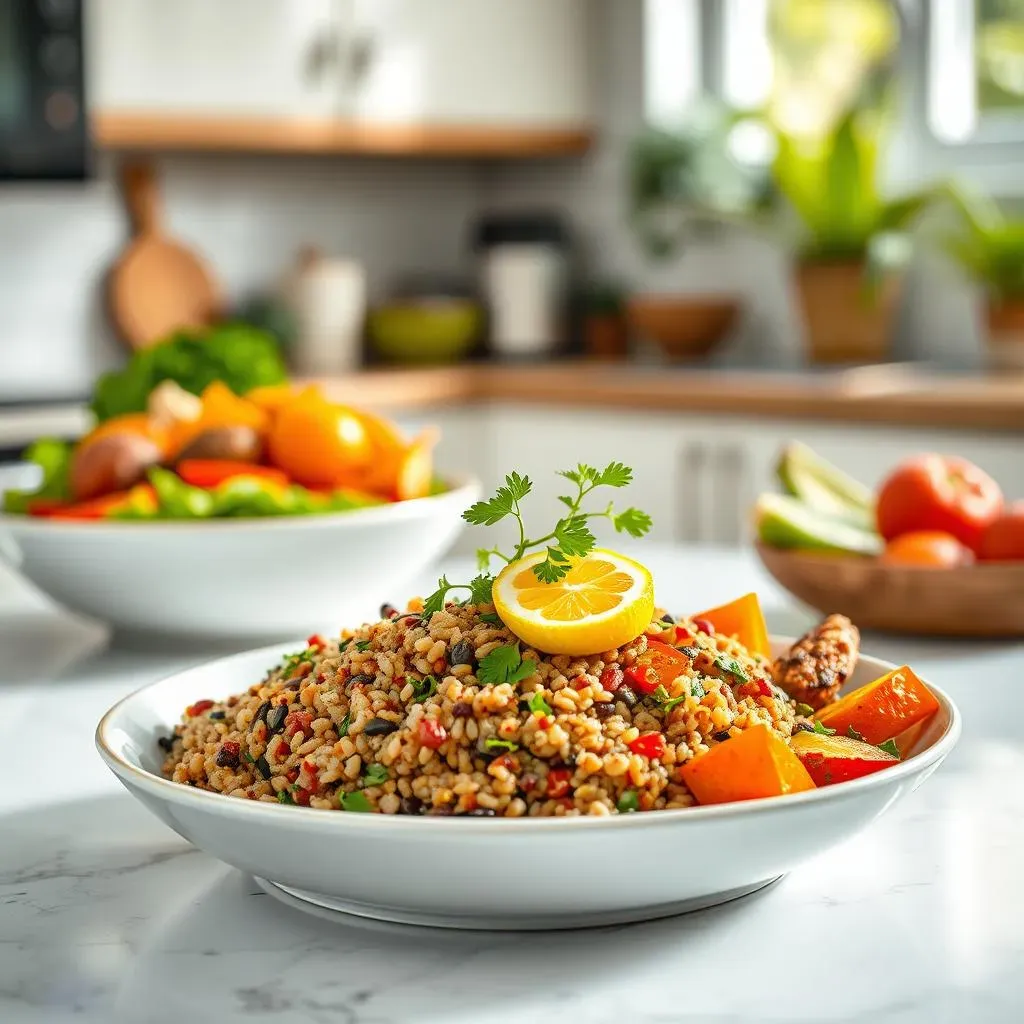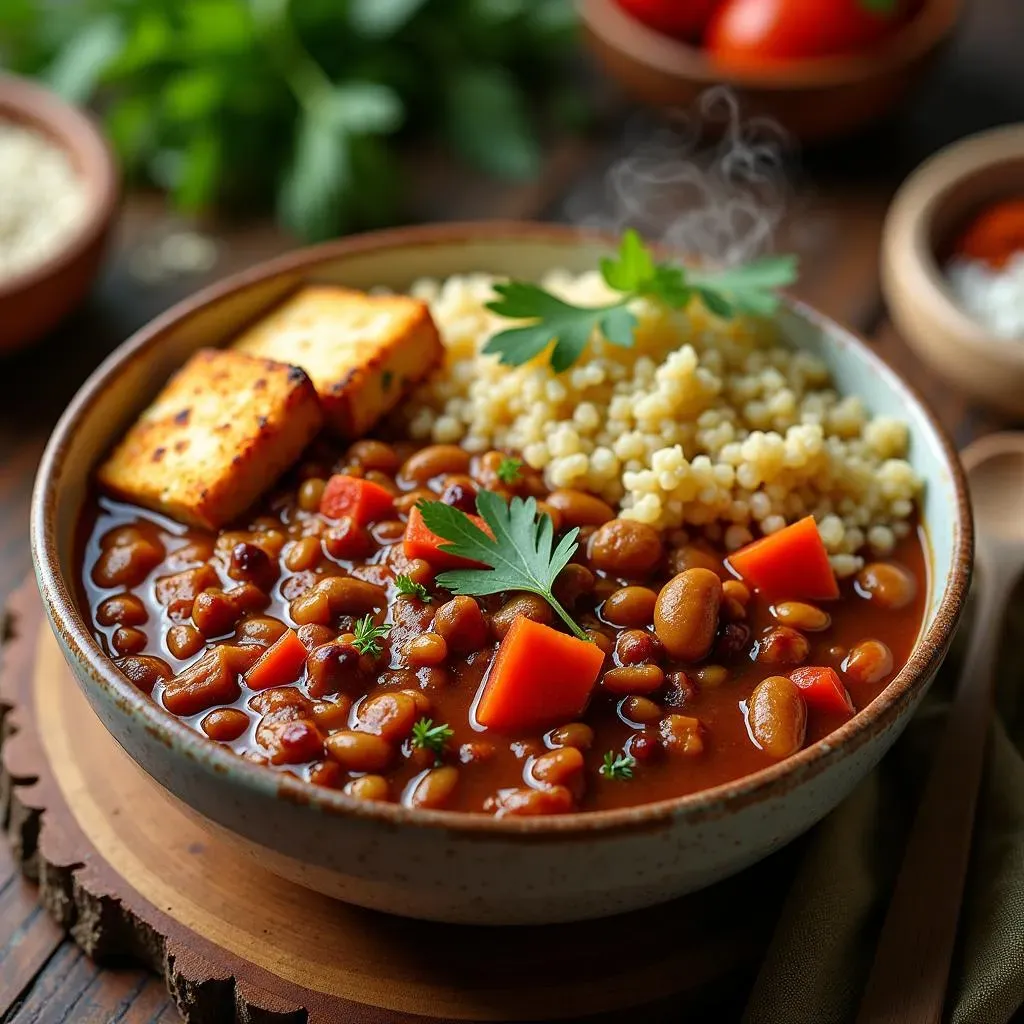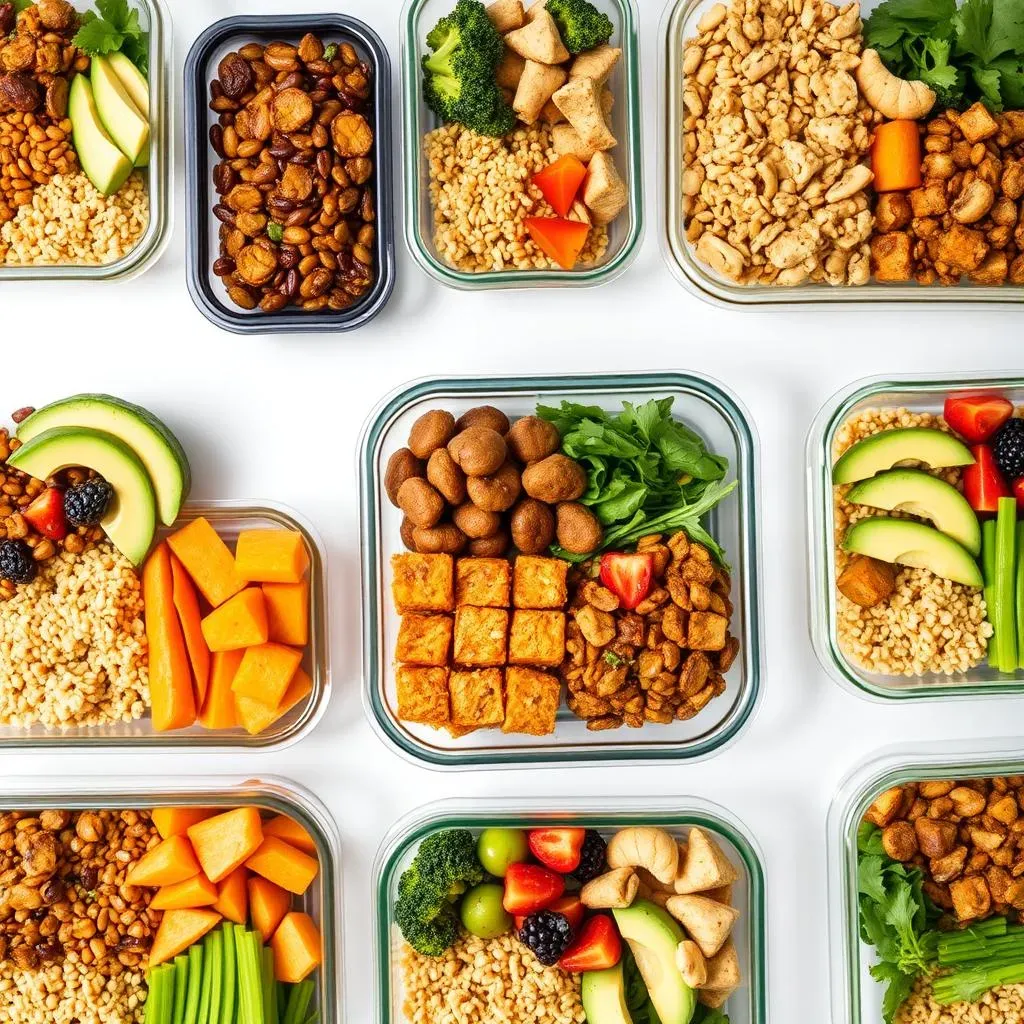Table of Contents
So, you're a vegetarian and you want to build serious muscle? Fantastic! You've come to the right place. Many people believe that packing on muscle requires a meat-heavy diet, but that's simply not true. This article is your ultimate guide to mastering "vegetarian meal prep ideas for muscle gain." We'll cut through the confusion and show you exactly how to fuel your body with delicious, plant-powered meals that will help you achieve your fitness goals. Forget bland salads and tasteless tofu – we're talking hearty, satisfying meals that are packed with protein and all the nutrients you need to build lean muscle mass. Get ready to discover creative vegetarian recipes, learn clever meal-prepping strategies, and unlock the secrets to a successful plant-based muscle-building journey. We'll cover everything from planning your weekly meals to mastering high-protein vegetarian recipes and mastering some essential tips and tricks. Let's build some muscle, the vegetarian way!
Vegetarian Meal Prep Ideas for Muscle Gain: Planning Your Week

Vegetarian Meal Prep Ideas for Muscle Gain: Planning Your Week
Getting Started: Your Weekly Meal Plan
Planning is key! Think of your weekly meal prep as a strategic campaign to build muscle. You wouldn't go into battle without a plan, right? Same goes for your fitness goals. Start by figuring out how many meals you'll eat each day. Most people find 4-5 meals work well, ensuring a steady stream of nutrients. Then, consider your workout schedule. You'll want more protein and carbs around your workouts to fuel your sessions and aid recovery. Don't forget to factor in your preferences! Find recipes you genuinely enjoy, otherwise you're setting yourself up for failure. Variety is also crucial – it keeps things interesting and prevents nutritional boredom. Finally, think about your grocery shopping. Create a comprehensive list based on your chosen recipes. This will ensure you have everything you need and avoid impulse buys.
Once you have your meal plan, the next step is to actually prepare the food. This is where your newfound organizational skills come into play. Set aside a few hours on a weekend (or even spread it out over a couple of days) to cook and portion everything. This way, you'll have healthy, delicious meals ready to grab and go throughout the week. Remember, consistency is key. Sticking to your meal plan will keep your body fueled and help you see results. Don't be afraid to experiment! Try new recipes and adjust your plan as needed. The most important thing is to find a system that works for you and helps you stay on track.
Day | Meal 1 | Meal 2 | Meal 3 | Meal 4 |
|---|---|---|---|---|
Monday | Tofu Scramble with Spinach | Lentil Soup | Quinoa Salad with Chickpeas | Black Bean Burgers |
Tuesday | Overnight Oats with Berries and Nuts | Hummus and Veggie Wrap | Lentil Shepherd's Pie | Greek Yogurt with Fruit |
Sample Weekly Grocery List:
- Tofu (1 block)
- Spinach (1 container)
- Lentils (1 cup dried)
- Quinoa (1 cup)
- Chickpeas (1 can)
- Black beans (1 can)
- Oats (1 container)
- Berries (1 pint)
- Nuts (1/2 cup)
- Hummus (1 container)
- Veggies for wrap (lettuce, tomatoes, etc.)
- Sweet potatoes (2 large)
- Greek yogurt (1 container)
"The only way to do great work is to love what you do." - Steve Jobs
HighProtein Vegetarian Recipes for Muscle Growth

HighProtein Vegetarian Recipes for Muscle Growth
Powerhouse Protein Sources
Let's ditch the myth that you need meat to build muscle! The truth is, there's a whole world of plant-based protein waiting to fuel your gains. Think lentils, chickpeas, quinoa, tofu, tempeh – these aren't just healthy, they're muscle-building powerhouses. The key is to combine different protein sources throughout the day to maximize your protein intake and get all the essential amino acids your body needs. Don't be afraid to experiment with different textures and flavors; there are tons of delicious ways to incorporate these protein sources into your meals.
One of the best things about vegetarian cooking is the sheer variety. You can create incredibly diverse and flavorful meals, and it’s easy to get creative with spices and herbs to keep things interesting. Think about adding different textures – crunchy veggies, creamy sauces, hearty grains – to make your meals more satisfying and prevent you from getting bored. Remember, consistency is key. The more you experiment and find recipes that work for you, the easier it will be to stick to your meal plan.
Protein Source | Protein per Serving (approx.) | Recipe Ideas |
|---|---|---|
Lentils (1 cup cooked) | 18g | Lentil Soup, Lentil Shepherd's Pie |
Chickpeas (1 cup cooked) | 15g | Hummus, Chickpea Salad, Curries |
Quinoa (1 cup cooked) | 8g | Quinoa Bowls, Quinoa Salad |
Tofu (1 block) | 36g | Tofu Scramble, Tofu Stir-fry |
Tempeh (1 cup) | 19g | Tempeh Bacon, Tempeh Steaks |
Recipe Spotlight: High-Protein Vegetarian Chili
This recipe is a winner! It's packed with protein, fiber, and flavor, and it's super easy to make in a big batch for meal prepping. It's also highly customizable – add your favorite veggies and spices to make it your own. This chili is perfect for a post-workout meal, providing your muscles with the protein and carbohydrates they need to recover. The fiber will also help you feel full and satisfied, preventing those pesky cravings.
Remember, the key to successful meal prepping is finding recipes you genuinely enjoy. Don't be afraid to experiment with different flavors and textures to keep your meals exciting and prevent boredom. And remember, consistency is key! Sticking to your meal plan will help you achieve your fitness goals.
- 1 tbsp olive oil
- 1 onion, chopped
- 2 cloves garlic, minced
- 1 bell pepper, chopped
- 1 (15-ounce) can black beans, rinsed and drained
- 1 (15-ounce) can kidney beans, rinsed and drained
- 1 (15-ounce) can diced tomatoes
- 1 cup vegetable broth
- 1 tbsp chili powder
- 1 tsp cumin
- 1/2 tsp smoked paprika
- Salt and pepper to taste
"The body achieves what the mind believes." - Napoleon Hill
Vegetarian Meal Prep for Muscle Gain: Tips and Tricks for Success

Vegetarian Meal Prep for Muscle Gain: Tips and Tricks for Success
Mastering Your Macros
Let's talk macros – the building blocks of your muscle-building journey. Understanding your macronutrient needs (protein, carbohydrates, and fats) is crucial. Aim for a high-protein intake (around 0.8-1 gram per pound of body weight), sufficient carbohydrates for energy, and healthy fats for hormone production and overall health. Don't get bogged down in obsessive tracking; focus on making healthy choices most of the time. Use a food scale to measure portions accurately, especially in the beginning, to get a feel for serving sizes. Remember, consistency is key. Tracking your macros initially can help you understand your dietary needs and adjust your meal prep accordingly.
Many online macro calculators can help you determine your individual needs based on your activity level and goals. Remember, this is a guideline, not a rigid rule. Listen to your body. Are you feeling energized and strong? Or are you sluggish and lacking motivation? Adjust your macro ratios as needed to optimize your performance and well-being. Remember, this is a journey, not a race. Be patient with yourself and celebrate your progress along the way. Don't be afraid to experiment and adjust your macro ratios as you learn what your body needs.
Macronutrient | Importance for Muscle Growth | Vegetarian Sources |
|---|---|---|
Protein | Builds and repairs muscle tissue | Lentils, chickpeas, tofu, tempeh, quinoa, Greek yogurt, nuts, seeds |
Carbohydrates | Provides energy for workouts | Quinoa, brown rice, sweet potatoes, oats, fruits, vegetables |
Fats | Supports hormone production, overall health | Avocado, nuts, seeds, olive oil |
Smart Snacking Strategies
Snacking strategically is essential for preventing energy crashes and keeping your muscles fueled between meals. Instead of reaching for processed snacks, choose nutrient-dense options that will support your muscle-building goals. Think a handful of almonds, a piece of fruit with some nut butter, or a protein smoothie. Pre-portion your snacks into individual containers for easy grab-and-go convenience. This will prevent you from overeating and keep your nutrition on track. Remember to choose snacks that are both satisfying and nutritious, so you don't end up feeling hungry and tempted to reach for something less healthy.
Planning your snacks in advance is just as important as planning your meals. Include snacks in your weekly meal prep to ensure you always have healthy options available. This will prevent those moments of weakness where you might grab something less healthy because it's convenient. Remember, small, consistent efforts add up to big results over time. By making smart snacking choices, you'll be well on your way to achieving your muscle-building goals.
- Greek yogurt with berries
- Trail mix (nuts, seeds, dried fruit)
- Hard-boiled eggs (if lacto-ovo vegetarian)
- Edamame
- Apple slices with peanut butter
Staying Consistent and Making it a Lifestyle
Consistency is the name of the game when it comes to building muscle. It's not about following a strict diet for a few weeks and then giving up; it's about making sustainable lifestyle changes that you can maintain long-term. Find a meal prep routine that fits into your schedule and doesn't feel overwhelming. Don't be afraid to adjust your plan as needed; life happens, and flexibility is key. Celebrate your progress along the way and don't get discouraged by occasional setbacks. Remember, building muscle takes time and dedication.
Consider this your permission slip to enjoy the process! Vegetarian cooking can be incredibly fun and creative. Experiment with new recipes, explore different cuisines, and find ways to make healthy eating enjoyable. Don't be afraid to ask for help or seek inspiration from online communities and resources. Remember, you're not alone on this journey. Surrounding yourself with a supportive community can make all the difference in staying motivated and achieving your goals. Building muscle is a marathon, not a sprint.
"Success is not final, failure is not fatal: it is the courage to continue that counts." - Winston Churchill